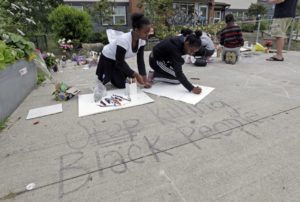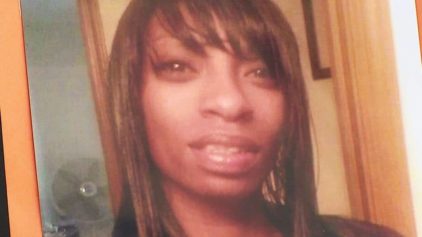
The threat of losing her children coupled with an abusive former partner weighed heavily on Lyles’ psyche. After her car windows were shattered she obtained a protective order against her abuser, but that order was violated and Lyles was assaulted again in August 2016. Her offender pled guilty to that assault and was released from jail in February.
Lyles called police again on June 5 when the father of her two eldest children showed up at her home unannounced. When police arrived at the scene, they found Lyles sitting next to her one-year-old daughter holding a large pair of scissors. According to an officer’s description of the encounter, Lyles then began acting erratically and threatened officers with the scissors while making claims that she could clone her daughter and morph into a wolf. She eventually surrendered to officers and spent 12 days in jail for harassment and obstructing an officer. A judge ordered her to seek mental health treatment as a condition of her release.
Because of these previous interactions, when Lyles called 911 to report a burglary on Sunday, June 18, Seattle Police Department (SPD) intentionally sent two officers to investigate. In audio and dashcam footage of the June 18 encounter released by SPD, the officers can be heard discussing the June 5 incident as they approach Lyles’ home. Lyles then lets both officers into her home and proceeds to show them what was burglarized. For reasons that are unclear from the audio, the situation escalates, with one of the officers requesting help. The department claimed afterwards that Lyles had been clutching a knife.
“Get back! Get back!” one officer shouts.
“Tase her!” his partner commands.
“I don’t have a taser,” the first officer answers. Several gunshots are fired, killing the pregnant mother of four. Three of Lyles’ four children were in the house at the time of the shooting.
The death of Charleena Lyles points to another ongoing problem with America’s police forces. Many lack training and the understanding on how to recognize and respond to citizens with mental illness. For Black people who already face a greater risk of being victims of police brutality, this creates a culture of fear that puts Black people who suffer from mental illness in greater danger from authorities when seeking help for mental health concerns or other issues.
A 2015 study conducted by the Washington Post found that 25 percent of the people who were shot to death by police were in the throes of a mental or emotional crisis. In most of these cases, police were not responding to reports of crime, but desperate calls from concerned relatives, neighbors, or bystanders regarding displays of mentally unstable behavior. The study found that more than half of the police departments involved in these killings failed to provide officers with appropriate training for dealing with mentally ill populations.
In 2011, SPD was one of 17 police departments that were investigated by the Department of Justice’s Civil Rights Division for patterns of excessive force and discrimination. The probe found that SPD engaged in practices of excessive force when arresting residents for minor offenses and that this violence was especially pronounced in encounters with the mentally ill and individuals under the influence of alcohol and drugs. SPD estimated that 70 percent of their use of force encounters involved these populations.
Following the investigation, SPD was ordered by federal decree to reform their unconstitutional police practices. A federal monitor was put in place and officers were required to complete Crisis Intervention Training (CIT) to better equip them for encounters with the mentally ill. In April of this year, the department was commended by their monitor for compliance with these reforms. With Lyles’ death coming on the heels of this report, it raises questions about whether these reforms effectively address racial bias within departments.
Seattle Police Chief Kathleen O’Toole revealed that both of the officers involved in the killing of Charleena Lyles underwent SPD’s Crisis Intervention Training (CIT), and that one was a certified CIT officer, meaning he had completed additional intensive de-escalation and mental-health intervention training. O’Toole confirmed that both officers had less-lethal options on hand to subdue Lyles, but did not say whether these less-lethal options were used.
According to the Health and Human Services Office of Minority Health, Black Americans are 20 percent more likely to experience serious mental health problems than the general population. The most common mental disorders among Blacks are major depression, attention deficit hyperactivity disorder (ADHD), suicide (among young Black men), and post-traumatic stress disorder (PTSD). Blacks are also more likely to experience homelessness and exposure to violence, which increase the likelihood for developing a mental health condition.
The rising prevalence of PTSD in Black communities can be partially attributed to violent encounters with law enforcement, with many Blacks claiming that the media’s portrayal of such violence often re-triggers their trauma.
Despite being at greater risk for mental illness, a 2015 report by the Substance Abuse and Mental Health Services Administration revealed that only 8.6 percent of Black Americans were likely to use mental health services. Factors that contribute to this include cultural stigma, lack of access to appropriate services, and a history of distrust and misdiagnosis.
Charleena Lyles’ death highlights the additional risk Black people with mental health issues face when attempting to seek help. That additional risk is the threat of death at the hands of the police. As police departments take additional steps to prepare their officers for encounters with the mentally ill, they must also take into account the racism (another mental illness) that their officers exhibit with people who may have physiological issues, that happen to be Black.

